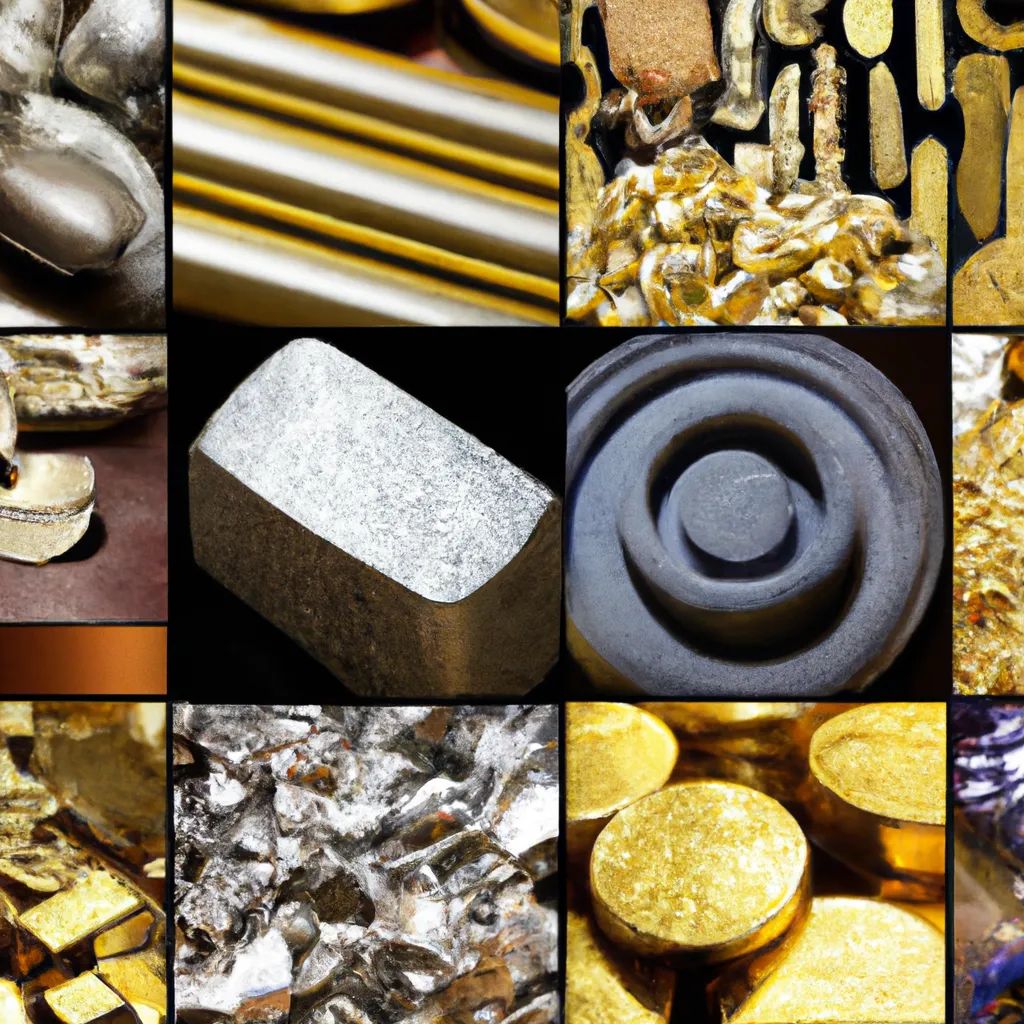Explore Shanghai's Commodities Market for Base Metals, Did you know that Shanghai, China is home to one of the world's largest commodities markets for base metals. Shanghai's commodities market is a hub for trading and investing in base metals such as copper, aluminum, and nickel. With a growing global demand for these metals, Shanghai's market plays a significant role in the global economy. But what sets Shanghai's market apart from others around the world.
Why is it such an important player in the commodities market. Let's take a closer look at the base metals market in Shanghai and what makes it unique. But this is just the beginning. We'll also explore the impact of global events, experts' opinions, and future forecasts on Shanghai's base metals market.
So, without further ado, let's dive into the world of commodities and discover the hidden treasures of Shanghai's base metals market, as told by experts in the field.

An introduction to base metals
Base metals play a crucial role in the global economy and have been an integral part of trade and commerce for centuries. These metals, which include copper, nickel, aluminum, zinc, and lead, are known for their strength, durability, and conductivity. They are widely used in various industries, such as construction, manufacturing, and electronics. In this article, we will discuss the different types of base metals, the benefits of trading them in shanghai, and the current market trends for these metals.
Understanding the different types of base metals
There are five main types of base metals: copper, nickel, aluminum, zinc, and lead. Each of these metals has unique properties and uses, making them essential in the industrial and commercial sectors. Copper, often referred to as the “red metal,” is widely used in electrical wiring, plumbing, and industrial machinery due to its high electrical and thermal conductivity. It is also a key component in the production of brass and bronze alloys, which are used in the manufacturing of utensils, coins, and jewelry. Nickel is a silvery-white metal known for its strength and resistance to corrosion. It is commonly used in the production of stainless steel, which is used in a wide range of applications, including kitchen appliances, medical equipment, and transportation vehicles. Aluminum is a lightweight and highly malleable metal that is widely used in the aviation, automotive, and construction industries. It is also commonly used in packaging materials, such as beverage cans, due to its ability to resist corrosion. Zinc is a versatile metal that is known for its anti-corrosive properties. It is used in the production of galvanized steel, which is widely used in the construction and automotive industries. Zinc is also a crucial component in the production of batteries, fertilizers, and paint coatings. Lead is a dense and soft metal, which makes it an excellent material for radiation shielding. It is also used in the production of lead-acid batteries, which are used in vehicles and backup power systems.
Benefits of trading base metals in shanghai
Shanghai, china's financial capital, is one of the world's largest metal trading hubs. It offers unique advantages for traders looking to invest in base metals. One major benefit is the presence of a commodity pool, which offers a physical marketplace for buyers and sellers to trade base metals. This pool helps to reduce the risk of price volatility and provides a more stable market for trading. Additionally, shanghai is home to the shanghai futures exchange (shfe), which is the world's third-largest metal futures market. The shfe offers a transparent and regulated platform for base metals trading, allowing investors to make informed decisions. Moreover, china is the world's largest consumer of base metals, making shanghai an ideal location for trading. The country's rapid industrialization and infrastructure development have led to a high demand for these metals, making it a profitable market for investors.
Exploring the current market trends for base metals
In recent years, there has been a growing demand for base metals, especially in emerging economies like china and india. This demand is expected to continue to rise, driven by the growth of the construction, automotive, and renewable energy industries. One significant trend in the market is the increasing use of base metals in the production of electric vehicles. As the world shifts towards cleaner and more sustainable transportation options, the demand for nickel, copper, and aluminum is expected to increase. Another trend is the move towards sustainable and ethical mining practices. With increasing awareness about the environmental and social impacts of mining, there is a growing demand for base metals that are responsibly sourced and produced. Furthermore, fluctuations in global supply and demand, as well as political and economic factors, can also affect the market trends for base metals. Base metals are essential for many industries and offer great potential for investors. Shanghai's role as a prominent metal trading hub, along with the increasing demand for these metals, presents a favorable environment for traders. Understanding the different types of base metals and staying informed about market trends can help investors make smart and profitable decisions.

The concept of commodity pools
The concept of commodity pools is not a new one. In fact, it has been around for decades and has provided investors with a way to gain exposure to a variety of commodities in a single investment. Commodity pools are essentially a type of investment vehicle that pools together funds from multiple investors to trade and invest in various commodities. These can include agricultural products, energy resources, and precious metals, among others.
How commodity pools work in relation to base metals
Base metals, such as copper, zinc, and lead, play a vital role in various industries and are an essential component of many everyday products. These metals are used in construction, manufacturing, and infrastructure, making them a highly sought-after commodity by investors. Commodity pools that specialize in base metals will typically invest in futures contracts, options, and other derivatives to gain exposure to these commodities.
When investing in a commodity pool focused on base metals, individuals can benefit from the expertise and resources of professional managers who have an in-depth understanding of the market. These managers will make strategic decisions on when to buy and sell contracts to take advantage of market trends and fluctuations. By investing in a commodity pool, individuals can gain a diversified portfolio of base metal investments without having to manage them directly.
The advantages and disadvantages of joining a commodity pool
There are several advantages to joining a commodity pool, especially for those looking to invest in base metals. One of the main benefits is the ability to gain exposure to a variety of commodities without the high costs of buying and owning physical commodities. Additionally, the pooled resources can allow for larger investments and potentially higher returns.
Another advantage of commodity pools is the professional management and expertise provided by the managers. These individuals have a deep understanding of the commodities market and can make strategic investment decisions on behalf of the pool. This can save individuals time and effort in managing their investments while also potentially yielding higher returns.
However, there are also some potential disadvantages to joining a commodity pool. One of the main concerns is the lack of control over investment decisions, as these are made by the pool's managers. Additionally, there may be fees and expenses associated with joining a commodity pool, which can decrease overall returns. It is crucial for individuals to carefully consider and research a commodity pool before investing.
Tips for choosing a reliable commodity pool in shanghai
Shanghai is a major financial hub and attracts a significant amount of investment in the commodities market, making it a popular location for commodity pools. When looking for a reliable and reputable commodity pool in shanghai, here are a few tips to keep in mind:
- research the track record and experience of the pool's managers. Look for those with a history of successful investments in the commodities market.
- consider the fees and expenses associated with joining the pool. Make sure they align with your investment goals and expectations.
- look into the types of commodities the pool focuses on and see if it aligns with your investment preferences.
- check if the pool is regulated and licensed by the relevant authorities, ensuring legal compliance and transparency.
- read reviews and testimonials from previous investors to gain insight into their experiences.
Overall, joining a commodity pool in shanghai can be an excellent way for individuals to gain exposure to base metals and other commodities in a cost-effective and diversified manner. However, it is essential to do thorough research and carefully consider the advantages and disadvantages before making an investment decision. By following the tips mentioned above, individuals can choose a reliable commodity pool that aligns with their investment objectives and risk appetite.

The role of precious metals in the shanghai market
Precious metals have long been considered a safe-haven investment, offering stability and protection against economic uncertainties. The shanghai market, one of the largest commodity markets in the world, has been a significant player in the trade of precious metals, showing a strong connection with base metals. In this section, we will explore the role of precious metals in the shanghai market and how investors can leverage them for maximum profit.
Understanding the connection between precious metals and base metals
Precious metals, such as gold, silver, and platinum, are widely known for their use in jewelry and as a store of value. However, these metals also have practical applications in various industries, such as electronics, healthcare, and energy. This translates to a constant demand for precious metals, making them an essential commodity in the global market.
In the shanghai market, the prices of precious metals have shown a strong correlation with the prices of base metals, such as copper, nickel, and aluminum. This is because both types of metals are often used in similar industries and are affected by overall economic trends. For example, when the demand for base metals increases due to economic growth, the demand for precious metals also rises, resulting in an increase in their prices.
Understanding the connection between precious metals and base metals can help investors make informed decisions when trading in the shanghai market. By closely monitoring the prices of both types of metals, investors can identify potential opportunities and adjust their trading strategies accordingly.
How to leverage precious metals for maximum profit in the commodities market
The shanghai market offers a vast array of investment opportunities for traders, including precious metals, through commodity pools. A commodity pool is a group of investors who pool their money together to trade in various commodities, including precious metals. Investing in a commodity pool can provide investors with diversification and risk management, as well as potential profits.
When trading in precious metals through commodity pools, it is crucial to have a solid understanding of market trends and perform in-depth research on the supply and demand factors that can affect prices. Keeping an eye on the current economic and political climate can also provide valuable insights into potential price movements.
Additionally, investors can also consider using leverage to increase their potential profits. Leveraging involves borrowing money to invest in larger quantities of precious metals, allowing investors to magnify their gains. However, leverage also comes with higher risks, and investors should use it cautiously, ensuring they have a reliable risk management strategy in place.
The outlook for precious metals in shanghai’s market
Despite experiencing a dip in prices in recent years, precious metals are expected to maintain their value and serve as a reliable investment option. The growing demand for precious metals in various industries, coupled with political and economic uncertainties, is likely to drive their prices higher in the future.
In particular, the implementation of china's belt and road initiative, which aims to boost trade and connectivity between china and other countries, can result in an increase in the demand for precious metals in the shanghai market. Moreover, with the growing shift towards renewable energy and electric vehicles, the demand for precious metals used in their production, such as silver and platinum, is expected to rise.
However, as with any investment, there are risks involved in trading precious metals. Fluctuations in prices, supply and demand imbalances, and market volatility can all affect the performance of precious metals in the shanghai market. Therefore, it is essential for investors to continually monitor market trends and have a well-defined risk management strategy in place.
Precious metals play a significant role in the shanghai market, offering investors a reliable and valuable investment option. Understanding the connection between precious metals and base metals and how to leverage them for maximum profit can help investors make informed decisions and navigate the commodities market successfully. With the expected growth in demand for precious metals in the future, they will likely continue to be a valuable asset for investors in the shanghai market.

Making the most of arbitrage opportunities
What is arbitrage and how does it apply to base metals?
Arbitrage, in its simplest form, is the practice of buying and selling assets in different markets in order to take advantage of price discrepancies and make a profit. In the world of finance and trading, arbitrage is a common strategy used by investors and traders to capitalize on market inefficiencies and generate returns.
When it comes to base metals, arbitrage opportunities can arise due to factors such as differing supply and demand dynamics across various markets, differences in production costs, and fluctuations in currency exchange rates. This presents opportunities for traders to buy base metals in one market and sell them for a higher price in another market, thus profiting from the price difference.
why base metals?
Base metals, which include commonly traded commodities such as copper, aluminum, and zinc, are essential components of many industries and play a crucial role in global economic growth. Due to the importance of these metals, there is a constant demand for them, making them a popular choice for trading and investment.
Furthermore, base metals have a lower barrier to entry compared to other commodities such as precious metals, meaning that smaller investors can also take advantage of arbitrage opportunities in this market. The availability of base metals in large quantities also makes it easier for traders to source and trade them across different markets.
Identifying and executing profitable arbitrage trades in shanghai
Shanghai, as one of the world's largest financial centers and a major base metals trading hub, presents lucrative opportunities for traders looking to engage in arbitrage. Here are some key tips for identifying and executing profitable arbitrage trades in shanghai:
- stay updated on market trends and conditions in shanghai, as well as in other markets where the base metals you are interested in are traded.
- keep an eye out for any significant price discrepancies between shanghai and other markets, and analyze the reasons behind them. This will help you determine the best time to enter the market and make a trade.
- utilize technical analysis tools and indicators to identify potential trading opportunities and set a price target for your trades.
- choose a reputable commodity pool or trading platform to conduct your trades in shanghai. This will ensure that your transactions are carried out efficiently and securely.
important considerations:
When trading in shanghai and taking advantage of arbitrage opportunities, it is crucial to consider factors such as currency exchange rates, transaction fees, and potential risk exposures. It's essential to constantly monitor the market and be prepared to act quickly if there are any sudden changes in prices or market conditions.
Avoiding risks and pitfalls in arbitrage trading
While arbitrage trading can be a profitable strategy, there are also risks and potential pitfalls that traders need to be aware of. Here are some tips to help you minimize these risks and maximize your chances of success:
- do your research and stay informed about the markets you are trading in, including any potential risks or challenges. This will help you make more informed and strategic decisions.
- be prepared to act quickly and efficiently when executing trades, as prices and market conditions can change rapidly in the world of arbitrage trading.
- diversify your portfolio to reduce the impact of any single trade or position. This will help mitigate potential losses if a trade doesn't go as planned.
- always have a stop-loss in place to protect yourself against any unexpected market moves.
conclusion
Arbitrage opportunities in base metals trading can be lucrative for traders who are well-informed and equipped with the right tools and strategies. With careful planning, risk management, and a solid understanding of market conditions, traders in shanghai and other international markets can successfully take advantage of these opportunities and make profitable trades. So keep these tips in mind and stay on top of market trends to make the most of arbitrage opportunities in the exciting world of base metals trading.
Understanding backwardation in the commodities market
The commodities market is known for its volatility and ever-changing nature, with prices constantly shifting based on various external factors. One key concept that traders and investors need to understand is backwardation, which is a term that refers to the relationship between the prices of futures contracts and the spot price of a commodity.
In this article, we will delve deeper into what backwardation means and how it specifically impacts the base metals market. We will also discuss how traders can take advantage of backwardation opportunities in shanghai and how it can be used as a risk management tool. So, let's begin by defining backwardation in the commodities market.
Defining backwardation and its impact on base metals
Backwardation is a term used to describe a situation in which the price of a futures contract is trading at a lower price than the spot price of a commodity. This usually occurs when there is a shortage of the commodity, or when its demand is higher than its supply.
In the base metals market, this means that the futures contract for a particular metal is trading at a lower price than what the metal is currently being sold for in the spot market. This may seem counterintuitive, but it can have significant implications for traders and investors.
When a commodity is experiencing backwardation, it usually means that there is a high demand for it in the current market. This can be due to a variety of reasons, such as an increase in industrial activity, speculation, or a decrease in production. Whatever the reason may be, backwardation can drive up the spot price of a commodity and create profitable opportunities for traders.
Spotting and taking advantage of backwardation opportunities in shanghai
Shanghai is one of the biggest markets for base metals, making it a prime location for traders to spot and take advantage of backwardation opportunities. With a strong demand for base metals in china, it is not uncommon for certain metals to experience backwardation.
To spot backwardation in shanghai, traders can monitor the prices of various base metals and compare them to their futures contract prices. If the futures contract is trading at a lower price than the spot price, it could indicate backwardation. However, it is essential to keep in mind that backwardation is not a guaranteed indicator of profitable opportunities and should be analyzed along with other market factors.
When backwardation occurs in shanghai, traders can take advantage of the opportunity by buying the physical commodity at its spot price and simultaneously selling the futures contract. This allows traders to profit from the difference between the two prices while also mitigating any potential risks associated with the market.
How backwardation can be a risk management tool for base metal traders
Aside from providing profit opportunities, backwardation can also serve as a risk management tool for traders in the base metals market. As mentioned earlier, backwardation usually occurs when there is a demand shortage for a particular commodity, which can drive up its spot price.
For traders who are looking to hedge their investments in base metals, backwardation can serve as an indicator of potential price increases. By taking a long position in the physical commodity and a short position in its futures contract, traders can protect themselves against potential losses from price increases. This can help minimize their risk exposure and protect their investments.
Additionally, backwardation can also be used as a signal for market trends. If a commodity continues to experience backwardation for an extended period, it may indicate a long-term trend in the market. Traders can analyze this information and use it to inform their trading strategies moving forward.
Backwardation is an essential concept for traders and investors to understand in the commodities market, particularly in the base metals sector. By keeping an eye out for backwardation opportunities in markets like shanghai and using it as a risk management tool, traders can enhance their chances of success in the constantly changing world of commodities trading.




